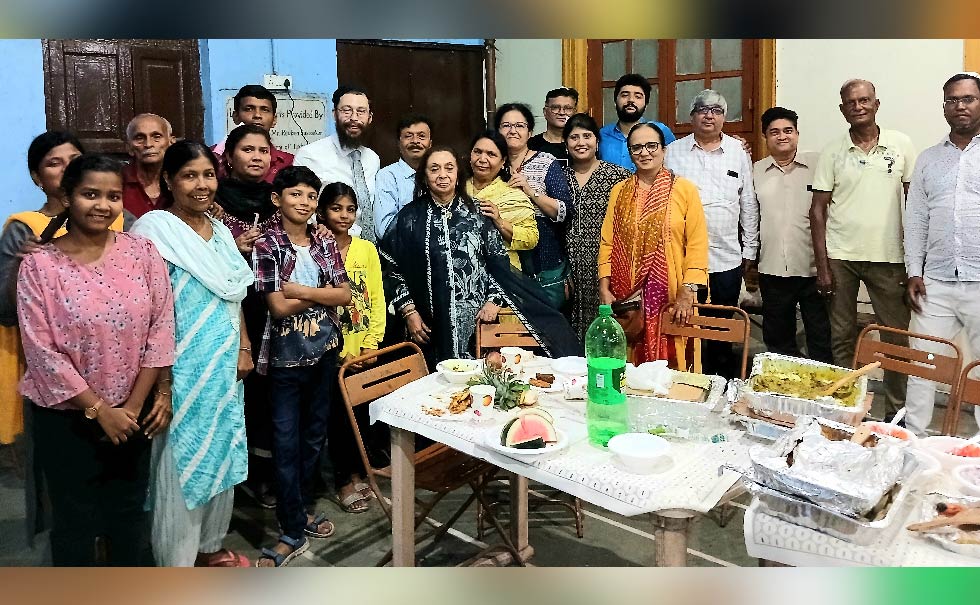Parshat Mishpatim
Shalom U’Vracha,
This week’s Parsha begins what I think for many students is really the crux of the matter and the focal investigation of our people:
Rather than detail our mythology and theological ideas, this Parsha begins a list of laws and their consequences and punishments.
Modern Judaism is split essentially between whether the laws of the Torah exist as metaphorical content or obligatory legal requirements: Orthodox and Reform may disagree on the context, application, and relevance of Chazal, the Rabbinical tradition of the explanation of the Torah, however they both draw their practice and understanding through the pool of knowledge and tradition.
It is impossible as a Jew living in our current paradigm not to be aware at the bi-polar expression of our culture and religious requirements; arguably from either polar side of the argument they appear lost in radical reinterpretation and additions/diminishing’s from any understanding of the Halachic legal process and requirement.
Regardless of how groups accept or reject this tradition, the absence of such a tradition leads to the ability to project whatever bias desired onto the Iron Age text – from Anunnaki aliens to Christian theology the text stands ready for such eisegesis (inserting a viewpoint into a text, rather than its opposite – exegesis).
We see worldwide the establishment of major religious movements based on interpretations of translations of specific verses and theological ideas, however, it stands as obvious that we as individuals living in 2021 we are totally incapable of imagining what the mindset, culture, and context of much of the Tanach occurs is – to argue as to “who has the most authentic tradition” is worryingly infantile and an obvious philosophical black hole from any modern perspective, constituting instead a lack of basic theological understanding as well as a glaring omission of history.
To be without such a tradition leaves one open to issues of hyper literalism within the text, clearly, elements of the Tanach are entirely metaphorical, other sections are entirely practical – the tradition also serves the purpose of expounding on laws that are only briefly mentioned. as well defining for us the actual context of each law and its limitations and conditions.
Even those who reject such an Oral Tradition are often forced through lack of an alternative to admitting that they either have some kind of “alternate tradition or that they have invented their interpretation – this applies to laws regarding prayer, Shabbat, Tzitzit, and many other areas – the fact that the pronouncement of the actual words and hence the grammar of the Torah itself as well as various other elements clearly require a tradition of some kind is obvious to every student of the Torah.
The pursuit of laws in of itself, not necessarily a religious pursuit, although arguably historically such fairly accepted universal laws, rights, and processes of legal jurisprudence have been spread by the various popular religions worldwide – religious movements and codes of ethical practice have intrinsically intertwined, especially as religions often enclothed the political or monarchical systems and brought together the worship of a deity and obedience to the ruling power – often these were identical as deity and king.
“And these are the laws which you shall set before them” (Shemot/Exodus 21:1)
“The phrase “and these” (always) implies that they are a continuation of what (subject) is written before. This is to teach us that just as the laws are written above (the Ten Commandments) are from Sinai, these too are from Sinai” – (Rashi):
The overwhelming sentiment here is that all Torah law is equally divine.
The quest for law in Judaism is to create a space and lifestyle in which morality and intellectual & emotional connection to Hashem is made possible through the fulfillment of active religious symbolic actions (Mitzvot).
It is further apparent that religious life (in a general world sense) requires the abstention of various foods and lifestyle choices, from religions that are totally ascetic to those more involved in worldly pursuits – I have heard previously that our ability to deny our urges and conform instead to Halacha takes the negative command of “לא” and returns us to our original state of connection with the Divine “אל” – since this sense of connection is lost during acts of immorality that as the Zohar and other Chassidic/Kabbalistic texts teach, that the sins we perform create a “curtain” or screens between us and our perception of the Divine.
Judaism considers itself pragmatically between such polar views – it simultaneously involves us in the world as well as requiring us to remain distinct from it:
An excellent example of this is the requirement for the Kosher dietary laws, which have served to keep our culture separated whilst absorbing the various cuisines from the various countries that they dwelt within.
Within our Parsha is:
| 23:19: The choicest of the first fruits of your soil you shall bring to the house of the Lord, your God. You shall not cook a kid in its mother’s milk. | יט רֵאשִׁ֗ית בִּכּוּרֵי֙ אַדְמָ֣תְךָ֔ תָּבִ֕יא בֵּ֖ית יְהֹוָ֣ה אֱלֹהֶ֑יךָ לֹֽא־תְבַשֵּׁ֥ל גְּדִ֖י בַּֽחֲלֵ֥ב אִמּֽוֹ: |
(courtesy of Chabad.org)
Rashi tells us:
“…This (law of milk and meat) is written in three places in the Torah, one for the prohibition of eating [meat with milk], one for the prohibition of deriving any benefit (from selling/gifting meat with milk), and one for the (act of) prohibition of cooking (a dish of meat mixed with milk).”
This Drasha, whilst famous throughout Kashrut is found in Talmud Chullin 113b & 115b and underscores a major point – we do not keep the Torah according to the plain understanding of the text:
Such a decision would be difficult as we no longer live in an agricultural iron age context, it would cause issues in theology such as with the usage of anthropomorphism with God throughout the Tanach and we would lack the necessary information on how to perform most of the Mitzvot and commandments within the Torah.
The Torah records the original Iron Age law whilst coding for us the legal principles that allow us to understand the legal mechanism and apply it to a range of modern contexts. We are modern people and clinging to non-current paradigms and emulation of pre-war Europe or indeed anywhere else serves little purpose or relevance, especially since regardless of our external appearance and outlook, our world is nonetheless powered by a vast technological, multinational network of commerce and communication, pretending that it is not the case or not relevant to us at an individual level is preposterous.
We must be aware of Hashem’s world and not hide away our understanding from the modern paradigm, we cannot ascribe ourselves the quest for truth and then simultaneously choose ignorance – that aside from its obvious logical paradox is perhaps best simply described as dishonest.
The other side of the coin is equally dishonest from a theological perspective, if one was driving along the road and the speed limit is 60mph, arguing with a traffic officer that you have “reinterpreted” the law to make it 80 or 100mph is tantamount to stating that the law in no way really exists, no punishments or consequences exist outside of a personal ethical arena:
If the law is entirely manipulatable, interpretable, and amorphous then what purpose does it serve at all?
If the morals behind the interpretive laws can themselves be re-interpreted, what then are the lessons behind any law, custom, or tradition?
Arguably one is left with a Judaism that serves little practical or even metaphysical purpose – except the megaphone of personal bias projected into ancient texts or a religious context.
In this choice between extremism beyond the letter of the law and the rejection of the principle itself – we find ourselves with little choice than to choose the blurry middle path to be both honest to our modern paradigm and our ancient heritage, may we blessed to walk both roads without contradiction.
Rabbi Jonathan Goldschmidt 2021 ©




